
Hello and welcome to Episode 43 of Read Paradise Lost with me, Jane Davis, a podcast and Substack newsletter about my project to read all of Paradise Lost by John Milton, aloud, and with a sometimes word-by-word, sometimes line-by-line discussion. This is a one-take recording with no editing, so forgive noise of seagulls, my coughing, or sound of men drilling next door. Rough and ready reading is what you get.
See Episode 1 for an introduction to the project.
Last time we had read to line 622, with Satan approaching Earth, landing for the moment on our sun, ‘undazzled’, and seeing, for the first time since his expulsion from heaven, a ‘glorious angel’.
We’ve a short potion of 58 lines to read this week.
he soon
Saw within kenn a glorious Angel stand,
The same whom John saw also in the Sun:
His back was turnd, but not his brightness hid;
Of beaming sunnie Raies, a golden tiar [ 625 ]
Circl'd his Head, nor less his Locks behind
Illustrious on his Shoulders fledge with wings
Lay waving round; on som great charge imploy'd
He seemd, or fixt in cogitation deep.
The question that came to me here was : who owns the word ‘glorious ‘ ? Satan is the one doing the seeing, so is it a word of his consciousness? or unconsciousness?
It is partly Milton’s word/view, of course. But I think it is also offered as what Satan sees. Which is provoking for Satan, as glorious as the angel may be, Satan won’t want, or can’t bear, to acknowledge that glory. Better to reign in Hell as he says in Book 2, than to serve in Heaven, and serving would mean acknowledging the realms and hierarchies of glory. Which he can’t or won’t do and yet - here it is. ‘A glorious Angel.’ the word is present, but Satan ignores it.
Interesting too that although when we were in Heaven, Milton’s visual imagination seemed to fade or fail, and we had disembodied voices to listen to, here now, closer to Earth, further from Godhead, the visual returns in glorious technicolour.
The next sentence (another short one, of four lines) is one of Milton’s most brilliant:
Glad was the Spirit impure as now in hope [ 630 ]
To find who might direct his wandring flight
To Paradise the happie seat of Man,
His journies end and our beginning woe.
We’re not told whether Satan saw the glory of this thoughtfully engaged angel, only that it was so, and as the next line unfolds, momentarily, I thought Satan was moved by that glory; (‘glad was the spirit’). But then we get the crashing reality of Satan’s position (‘impure’) which corrupts both ‘glad’ at the start of the line and ‘hope’ at its end. What a line! Glad and hope opening and closing and yet reduced to rubble in the centre. This glorious presence is merely a means to Satan’s end - ‘our beginning woe.’
And now Satan really sets about his work:
But first he casts to change his proper shape,
Which else might work him danger or delay: [ 635 ]
And now a stripling Cherube he appeers,
Not of the prime, yet such as in his face
Youth smil'd Celestial, and to every Limb
Sutable grace diffus'd, so well he feign'd;
Under a Coronet his flowing haire [ 640 ]
In curles on either cheek plaid, wings he wore
Of many a colourd plume sprinkl'd with Gold,
His habit fit for speed succinct, and held
Before his decent steps a Silver wand.
A reader asked what Satan looked like before this change - what is ‘his proper shape’ ?- was he burnt and filthy from the fires of Hell? Remember how badly the fallen angels were changed after their fall, so that Satan could barely recognise Beelezebub? (If thou beest he but oh how changed…’ Bk 1 line 84)
This disguise as a stripling cherub, lower in the celestial hierarchy than Uriel, puts Satan forward as beautiful, unthreatening and innocent presence.
He drew not nigh unheard, the Angel bright, [ 645 ]
Ere he drew nigh, his radiant visage turnd,
Admonisht by his ear, and strait was known
Th' Arch-Angel Uriel, one of the seav'n
Who in God's presence, neerest to his Throne
Stand ready at command, and are his Eyes [ 650 ]
That run through all the Heav'ns, or down to th' Earth
Bear his swift errands over moist and dry,
O're Sea and Land; him Satan thus accostes;
Satan no doubt was alarmed by sight of Uriel, whom he would recognise as one of his arch-enemies and one of God’s right-hand angels, one of the seven who ‘are his Eyes’, yet there is sign of any such acknowledgement, no falter, no fear in his response. He is single-mindedly gathering his forces for the assault:
Uriel, for thou of those seav'n Spirits that stand
In sight of God's high Throne, gloriously bright, [ 655 ]
The first art wont his great authentic will
Interpreter through highest Heav'n to bring,
Where all his Sons thy Embassie attend;
And here art likeliest by supream decree
Like honor to obtain, and as his Eye [ 660 ]
To visit oft this new Creation round;
Unspeakable desire to see, and know
All these his wondrous works, but chiefly Man,
His chief delight and favour, him for whom
All these his works so wondrous he ordaind, [ 665 ]
Hath brought me from the Quires of Cherubim
Alone thus wandring.
First there is what seems a little flattery: ‘Uriel…of those seven spirits… the first’.
But when I read the notes in my Fowler edition, I found Milton had biblical and other authorities for making Uriel ‘first’. I’ll paste a photo of the note at the end. I learned from the notes too that Satan is wise to make himself one of the cherubim, an order of angels excelling in knowledge. In making his supposed journey to see the new created world, this cherub is pursuing his vocation, which is to know things:
Brightest Seraph tell
In which of all these shining Orbes hath Man
His fixed seat, or fixed seat hath none,
But all these shining Orbes his choice to dwell; [ 670 ]
That I may find him, and with secret gaze,
Or open admiration him behold
On whom the great Creator hath bestowd
Worlds, and on whom hath all these graces powrd;
That both in him and all things, as is meet, [ 675 ]
The Universal Maker we may praise;
Who justly hath driv'n out his Rebell Foes
To deepest Hell, and to repair that loss
Created this new happie Race of Men
To serve him better: wise are all his wayes. [ 680 ]
Through this part of Satan’s speech, where man is the race ‘on whom the great Creator hath bestowd/Worlds’ Milton alludes once more to the possibility of other worlds and to the philosophic problem of whether those worlds are also man’s domain.
I was shocked when Satan mentioned the war in heaven - the disguise and questioning about Earth seemed one thing, but here the open allusion to himself (‘his rebel foes’) seems an incredible close-to wind-dare somehow. And will wise Uriel, God’s eyes on the sun, fall for this deception?
So spake the false dissembler unperceivd;
For neither Man nor Angel can discern
Hypocrisie, the onely evil that walks
Invisible, except to God alone,
By his permissive will, through Heav'n and Earth: [ 685 ]
A reader was startled by the word ‘hypocrasie’ here, and felt it had come direct from Milton himself, rather than arising from the needs of the poem. Certainly this is the voice of narrator, of the poet, of Milton. (Compare this with ‘glorious’ we began with today. That word seemed not only Milton’s but also perhaps Satan’s, certainly part of the poem’s reality.)
Yes, perhaps this thought has arisen as the result of his own experiences as a man in a time of political upheaval, of civil war. Perhaps connected, too, to the vulnerability he must experience because of his loss of sight - I’m thinking of the tale of his daughters telling the servant to steal his books and sell them, and pocket the money.
Whether arising from personal experience or not, Milton’s poetic voice wants to assert that no intelligence but God’s can see hypocrisy for what it is, and this assertion sent me to the etymological dictionary to learn what hypocrisy is:
That’s it for this time, more next week.
Notes from Fowler edition:
-
-










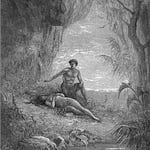
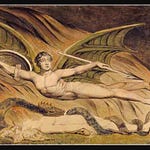

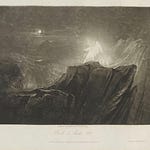
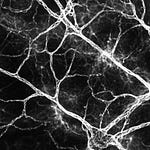
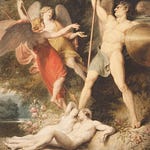
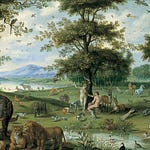
Share this post